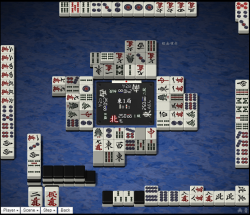Suukantsu
| Type | Yakuman |
|---|---|
| Kanji | 四槓子 |
| English | Four kans |
| Value | Yakuman |
| Speed | Extremely slow |
| Difficulty | The most difficult |
Suukantsu 「四槓子」 is a standard yakuman obtained when the hand has called kan four times. As a result, it always has a hadaka tanki machi, because four tile calls are required. Suukantsu is the rarest hand in the game, even more rare than tenhou or chiihou. It is also the longest, requiring 18 tiles total.
Tile pattern
Development

This yakuman requires four kan calls. As a result, the hand in tenpai always uses hadaka tanki. In order to call a single kan, a player must draw at least 3 out of 4 of a single tile type under any of these three scenarios:
* A player has a pair and calls pon. Then draws the fourth to call kan.t
- A player has a closed triplet and calls kan on a discarded fourth.
- A player draws all four of a tile type and calls kan.
For this yakuman, a player must repeat any of those kan calls four times. This yakuman is the most difficult yakuman to attain tenpai, let alone score.
- You must obtain a total of 4/4 tiles of four different types. If any tile is rendered unavailable (e.g. in an opponents hand, in the dead wall), the hand is practically impossible.
- You must obtain 3/4 tiles of four different types by self draw. This feat is already worth a yakuman, that being suuankou.
- After the third kan, any other player may call kan to trigger the suukaikan hand abortion (if the ruleset allows abortive draws).
- Calling four kans adds four kan dora, which will greatly boost the value of others' hands.
- Calling four kans immediately reveals you have a yakuman hand, so players are likely to defend.
- The hand always has a hadaka tanki wait. In addition to being difficult to win off, it leaves you with no room to defend.
Value
Despite the greater degree of difficulty and exceptionally low frequency of occurrence, the value remains as that of the other single yakuman.
External links
- Suukantsu in Japanese Wikipedia
| |||||||||||||||||||||||||||||||
